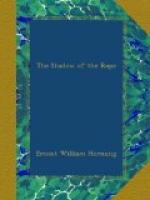“Do you know Mr. Steel so well—so much better than we do—and can you ask for particulars about anything he ever does? His marriage,” continued Mrs. Venables, “like everything else about him, is ’wrop in mystery,’ as one of those vulgar creatures says in Dickens, but I really forget which. It was never announced in the Times; for that I can vouch myself. Was ever anything more like him, or less like anybody else? To disappear for six months, and then turn up with a wife!”
“But has he turned up?” cried the vicar’s young wife, forgetting for a moment a certain preoccupation caused by the arrival of the tea-tray, and by a rapid resignation to the thickness of the bread and butter and the distressing absence of such hot things as would have been in readiness if Mrs. Venables had been expected for a single moment. It showed the youth of Morna Woodgate that she should harbor a wish to compete with the wealthiest woman in the neighborhood, even in the matter of afternoon tea, and her breeding that no such thought was legible in her clear-cut open-air face.
“I have heard nothing about it,” said the vicar, in a tone indicative of much honest doubt in the matter.
“Nor is it the case, to my knowledge,” rejoined Mrs. Venables; “but from all we hear it may become the case any moment. They were married in Italy last autumn—so he says—and are on their way home at this minute.”
“If he says so,” observed the vicar, with mild humor, “it is probably true. He ought to know.”
“And who was she?” his young wife asked with immense interest, the cups having gone round, and the bread and butter been accepted in spite of its proportions.
“My dear Mrs. Woodgate,” said Mrs. Venables, cordially, “you may well ask! Who was she, indeed! It was the first question I asked my own informant, who, by the way, was your friend, Mr. Langholm; but he knew no more than the man in the moon.”
“And who told Mr. Langholm, of all people?” pursued Morna Woodgate. “It is not often that we get news of the real world from him!”
“Birds of a feather,” remarked her caller: “it was Mr. Steel himself who wrote to your other eccentric friend, and told him neither more nor less than I have told you. He was married in Italy last autumn; not even the town—not even the month—let alone the lady’s name—if, indeed—”
And Mrs. Venables concluded with a sufficiently eloquent hiatus.
“I imagine she is a lady,” said the vicar to his tea.
“You are so charitable, dear Mr. Woodgate!”
“I hope I am,” he said simply. “In this case I see no reason to be anything else.”
“What—when you know really nothing about Mr. Steel himself?”
And the bright brown eyes of Mrs. Venables grew smaller and harder as they pinned Hugh Woodgate to his chair.
“I beg your pardon,” said that downright person; “I know a great deal about Mr. Steel. He has done an immense amount for the parish; there are our new schoolrooms to speak for themselves. There are very few who would do the half of what Mr. Steel has done for us during the short time he has been at Normanthorpe.”




